Friday, January 26, 2007
posted by Steve Tompkins
Greg Manchess, who came across so personably as both a panelist and an informal conversationalist during the recent World Fantasy Convention in Austin, will do his part and then some to ensure the success of the 2007 Howard Days as Guest of Honor. And yet his selection, through no fault of his, makes me want to recite Ossianic verses or intravenously inject peat whiskey or do something else expressive of Gaelic melancholia. Can’t help recalling the testimonials in Exorcisms and Ecstasies and reflecting what a Guest of Honor to End All Guests of Honor Karl Edward Wagner would have made, especially in advance of his Long Goodbye phase. Gary Romeo might have felt duty-bound to boycott the festivities and establish a rival or schismatic Howard Days, the equivalent of an Avignon papacy, outside a certain former residence in Plano, but most celebrants would have come away with anecdotes to be prized like amulets.
KEW is in no position to serve as Guest of Honor, unless we figure out how to work the Orastes/Valerius/Tarascus/Amalric trick. But with all due respect for the carnosaur-sized footprints the two current frontrunners have left all over Howard studies, he does belong on the Black Circle ballot as much as anyone save Novalyne Price Ellis herself (Leo asked for suggestions, and I can’t believe I spaced; guess I’m an imperfect Wagnerite). I went on and on in the Lion’s Den this past year about Wagner’s credentials as an REH editor and exponent, and will refrain from flogging that dead destrier here. Perhaps the thing to do is to add his name next year; for de Camp to beat KEW into the Black Circle would be a justice-miscarriage of Shub-Niggurathian proportions.
Sorry, Karl. Won’t happen again.
LEO ADDS: I put him on the list. No big deal, anyone who has voted and wants to change their vote before March 1 is welcome to. There’s probably a lot of others we could add to that list, but I figure we might as well wait until someone raises a stink about them.
Thursday, December 14, 2006
posted by Steve Tompkins
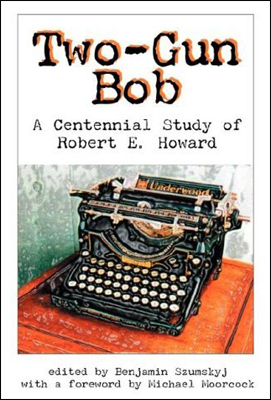
S.T. Joshi’s article “Bran Mak Morn and History” in Two-Gun Bob: A Centennial Study of Robert E. Howard comes trailing a backstory that originated with the author’s 1996 magnum opus H. P. Lovecraft: A Life. That book more than deserved its Bram Stoker and British Fantasy Awards, but phrases from the pages (502-503) on which Robert E. Howard is introduced as an untutored provincial-turned-pen pal were destined (and designed?) to live in infamy among even the least touchy Howardists: “Fanatical cadre of supporters,” “subliterary hackwork that does not even begin to approach genuine literature,” “[Howard’s] views are not of any great substance and profundity,” “Howard’s style is crude, slipshod, and unwieldy.” The artful dismissal-intensifier “does not even begin to approach” is surpassed a page later when Joshi quotes Lovecraft’s “There’s a bird whose basic mentality seems to me just about the good respectable citizen’s. . .” evaluation of REH in a December 14, 1935 letter to Kenneth Sterling and then editorializes “If Howard’s later devotees would adhere to this view, they would make themselves a little less ridiculous in proclaiming vast profundity and originality for his work.” Only a little less ridiculous, mind you — that might qualify as the unkindest cut of all, were there not many cuts yet to come.
In 2001 Howard occasioned what has to be the worst passage in one of Joshi’s very best books, Ramsey Campbell and Modern Horror Fiction. Here is as good a place as any to mention that when Joshi is writing about those like Campbell or Shirley Jackson or Thomas Ligotti who broadcast on his preferred frequencies and speak to his sensibilities, few genre critics repay reading as much as he does. Otherwise, however, he can be so condemnatory as to suggest a reflexively merciless, possibly infanticidal tribal deity casting the aesthetically or morally misshapen forth into the Outer Darkness. Let’s steel ourselves to gaze upon his expanded inventory of Howardian infractions (page 148 in the Campbell book):
Howard’s prodigious imagination in conceiving the life and actions of primitive peoples is certainly remarkable. It was probably derived from his own fascination with what he perceived to be the freedoms of barbarian life and his implacable hostility to civilization — attitudes fostered by his being the descendant of one of the original settlers of Texas and his lifelong residence in the remote village of Cross Plains. These provocative conceptions are, however, frequently offset by a lamentable crudity of expression and a yielding to the most hackneyed conceptions of pulp fiction: characters who are broad caricatures rather than living beings; lurid bloodletting and melodrama; implausibility of action, especially with regard to supernatural phenomena; and a general slovenliness in diction and plot development. Howard and his work have attracted a small but vocal band of cheerleaders who are determined to give him high rank as a writer and thinker, but it is unlikely that he will ever have as high a standing as, say, his friend H. P. Lovecraft in general literature.
(Continue reading this post)
Friday, November 24, 2006
posted by Steve Tompkins
Okay, the success of Happy Feet (which edged out the most Flemingesque Bond film since On Her Majesty’s Secret Service to be the #1 movie last weekend) following the 2005 March of the Penguins phenomenon moves me to protest this current status as the feel-good flightless fowl of the 21st century. Enough with the cutesification; where are the weird fiction penguins? Where are the mutant penguins, the albino penguins, the birds who can intimidate leopard seals and feral Shoggoths or freeze Miskatonic expeditions in their tracks with a single well-timed “Tekeli-li!”
Give us penguins Who Know Too Much (consult Chaosium’s 1996 The Antarktos Cycle for details), red-eyed and raucous-voiced witnesses to the cosmic tragedies and iniquities that have unfolded on the austral icecap for the last few million years. Children of all ages need nightmares and today’s animators just aren’t getting the job done.
Friday, October 20, 2006
posted by Steve Tompkins
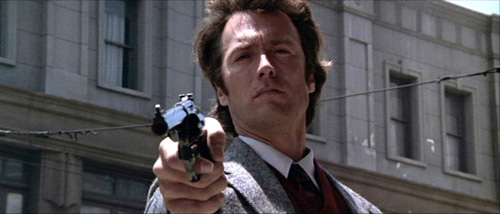
Manohla Dargis, formerly of the Los Angeles Times and now of the New York Times, can be an irritating film critic. But today, writing about Clint Eastwood’s Flags of Our Fathers, she gets one as right as it is possible to get:
One view of Mr. Eastwood is that he has mellowed with age, or at least begun to take serious measure of the violence that has been an animating force in many of his films. In truth, the critical establishment caught up with the director, who for decades has been building a fascinating body of work that considers annihilating violence as a condition of the American character, not an aberration.
Annihilating violence as a condition of the American character; Dargis is of course paraphrasing D.H. Lawrence’s most famous epigram from Studies in Classic American Literature, the one that begins “The essential American soul…” Eastwood’s career has been an enactment of that Lawrentian insight ever since No Name rode into the bordertown of San Miguel on his mule, and Iwo Jima, the subject of Flags of Our Fathers and the inspiration, along with the even ghastlier charnelhouse Okinawa, for so much of postwar science fiction’s “bug hunt” iconography, is an appropriate coda, or near-coda, to that career.
(Continue reading this post)
Wednesday, October 11, 2006
posted by Steve Tompkins
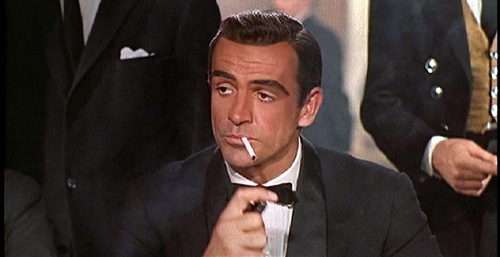
Longtime REHupan and TC contributor J.D. Charles and I could not be farther apart on various political, literary, and cultural issues if one of us resided in the Andromeda Galaxy. That having been said, apparently we’re both Ian Fleming fans as well as REH aficionados, and today Big Jim posted about how the two writers have fared cinematically at rehinnercircle:
Anybody who gripes about the Millius [sic] Conan flick really needs to sit down and read one of the classic Fleming Bond yarns then watch the movie “adaptation” featuring Connery or Moore. You will get down on your knees and thank CROM that Conan never had to undergo such drastic alteration.
In a word, no. Nein. Nyet. De gustibus non disputandem est — except in those emergencies where the “disputandem” part becomes unavoidable in the face of rampant absurdity. The Roger Moore Bond films are what they are (with the commendable exception of 1981’s For Your Eyes Only, into which screenwriters Richard Maibaum and Michael Wilson worked some relict Fleming-derived scenes), but Big Jim also mentions the Sean Connery era. From Russia With Love, Goldfinger, and Thunderball are, like diamonds, forever — launchpads for the modern action film, bravura exercises that imprinted themselves on Sixties popular culture almost as much as did the Beatles. More pertinently, the original creative team of Maibaum, Terence Young (or Guy Hamilton), Peter Hunt, Ken Adam, John Barry, and Connery himself succeeded brilliantly in adapting Fleming’s novels, whereas Milius couldn’t even be bothered to try with Howard’s Conan stories. Goldfinger and Thunderball are recognizable versions of the source material (note that Auric’s masterplan for the raid on Fort Knox is more ingenious and less logistically challenged in the movie than in the novel); Conan the Barbarian is an adaptation of nothing save a bit of “The Thing in the Crypt,” out-of-context signature moments from “A Witch Shall Be Born” and “Queen of the Black Coast,” and Milius’ Zen-surfing superiority complex. Kurosawa for retards. Karl Edward Wagner, an author Big Jim is on record as respecting, put it best: Li’l Abner versus the Moonies.
(Continue reading this post)
Friday, October 6, 2006
posted by Steve Tompkins
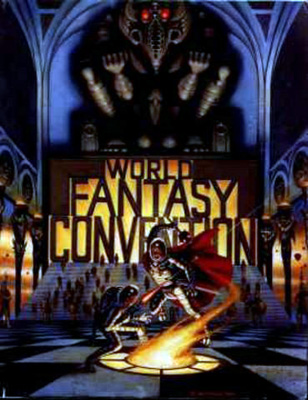
With the Austin-tatious honoring of REH at the 2006 World Fantasy Convention now as much of a near future mega-event as all those pre-Halloween cable channel reruns of Pumpkinhead, it might be worth our while to revisit some past WFC glories (“Past Award Winners and Nominees” can be clicked on year by year at the bottom of this page), beginning with the very first one, which was held in that reification of H.P. Lovecraft’s soul, Providence, Rhode Island. Robert Bloch surmounted his youthful gibe about sending Conan to cut out paper dolls in Valhalla by copping a Life Achievement Award. Karl Edward Wagner was up for the Short Fiction Award for “Sticks,” as was T.E.D. Klein for “The Events at Poroth Farm,” but both lost to Robert Aickman — no disgrace there. Ian and Betty Ballantine won a Special Award (Professional), and all these years later we can amuse ourselves by imagining that the judges singled out the Ballantines sotto voce for having ensured that Lin Carter would never quite be able to raze his own reputation to the ground and sow said ground with salt. [You can view many pictures from the first WFC here].
In 1976 the WFC moved to New York City, where Fritz Leiber won a Life Achievement Award (The Robert E. Howard of a different space/time continuum would have been only 70 years old and might have been one of the judges, were he not being called up onstage to accept a Life Achievement himself). Leiber also nabbed the Short Fiction Award for one of his best stories, “Belsen Express,” beating out David Drake’s “the Barrow Troll” (How could anyone not warm to a title like “The Barrow Troll”?). Richard Matheson’s Bid Time Return defeated Stephen King’s Salem’s Lot for the Novel Award; don’t agree with that at all. Avram Davidson’s The Enquiries of Doctor Esterhazy edged Harlan Ellison’s Deathbird Stories for the Collection/Anthology Award, and with all due respect to Davidson, Ellison wuz robbed. More gratifyingly, Frank Frazetta won the Artist Award (spare some empathy for the other fantasy artists of that period; Frazetta’s presence would have been rather like letting Achilles compete in a Most Efficient Death-Dealer contest at Troy), and KEW, David Drake, and Jim Groce won a special award (Non-Professional) for Carcosa Press.
(Continue reading this post)
Thursday, September 28, 2006
posted by Steve Tompkins
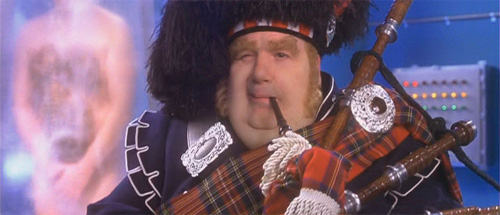
Roughhousing with Slasher in “Beyond the Black River” the other day, I came across this on page 51 of The Conquering Sword of Conan (the Cimmerian is balking at the prospect of the forest demon absconding with Tiberias’ head): “I never liked the fat bastard, but we can’t have Pictish devils making so cursed free with white men’s heads.”
Once the gigantic mirth subsided I started checking the story’s previous appearances. Conan the Warrior has “I never liked the fat fool.” Hans Stefan Santesson’s 1970 anthology The Mighty Swordsmen has “I never liked the fat fool.” Red Nails, the 1977 Berkley volume edited by Karl Edward Wagner, has “I never liked the fat fool.” So does Robert Adams’ 1985 anthology Barbarians. So obviously “fat fool” is from the Weird Tales text, whereas “fat bastard” must have been reinstated by Patrice Louinet from Howard’s final draft. It would be interesting to know what Farnsworth Wright’s SOP was for minor or single-word emendations like this. He couldn’t fax or e-mail Howard, and even telephoning might have busted the WT budget, so presumably he went full speed ahead and changed the wording himself.
(Continue reading this post)
Monday, September 11, 2006
posted by Steve Tompkins
It’s a strange, strained, overly scripted day in lower Manhattan — how could it not be? Complaining that this culture we’re stuck with is given to hype and hucksterism is about as useful as complaining that the ocean is wet, so instead I’ll mention that the sky is a high-alert hornet’s nest of gunships and newschoppers, but otherwise the precise shade of azure that we’ve come to think of as “September 11 blue.” In the past 5 years the financial district has morphed into a dual-usage, newly residential neighborhood, swarming with young couples towing or being towed by their toddlers and pets — and that’s certainly one in the ‘nads for Thanatos and his cave-dwelling, video-releasing lieutenants.
My co-workers and I have long since finished swapping memories of that morning, so this blog will come in handy. Can’t forget the suddenly de-officed paperwork, more than any previous human civilization could have produced, snowstorming down on us after being converted to confetti by some apocalyptic document shredder. And as long-suffering REHupans can attest, I tend to think in literary allusions and resonances, so that when I try to recall the wordless but oh-so-vocal reaction of the thousands of evacuees and rubber-neckers on Greenwich Street as the second tower despaired of further verticality, it’s the famous first sentence of Thomas Pynchon’s masterpiece Gravity’s Rainbow that flashes through my mind: “A screaming comes across the sky.” I associate the tongue-coating taste of the destruction that drove us northward, block after block after block, with Gollum’s rejection of the proffered lembas bread in The Two Towers: “Dust and ashes, we can’t eat that.” Robert E. Howard comes into it, too, what with his prescience about cult-like conspiracies based in Afghan hill-forts, dreaming of globalized murder, or my thoughts of a high school friend who died that morning and the fact that he’s still unavenged. Like so many here, I’d do the avenging myself if granted the chance; some situations just cry out for the Old Testament rather than the New (It occurs to me that part of the genius of “The Dark Man” is that de facto representatives of both — Turlogh and the priest — are allowed to make forceful cases, and neither discredits the other).
(Continue reading this post)
Wednesday, September 6, 2006
posted by Steve Tompkins

Me, I’ve never had any strong opinion about the late Steve Irwin, although I agree with him that “Crocs rule!” (While watching the old Tarzan films on TV as a child, I used to pray for a riled-up river dragon to play catch-and-non-release with Johnny Weissmuller, holding him underwater and thereby sparing us Jungle Jim).
So if I mention that militant-enough-to-give-harridans-a-bad-name academic Germaine Greer crashed the wake all of Australia seems to be staging for Irwin to fault him for “massive insensitivity” and “jumping all over crocodiles” like the worst kind of whip-cracking, chair-prodding lion-tamer, it’s only because it affords me an excuse to trot out my favorite Greer-bite. The success of the Peter Jackson Lord of the Rings films and the tendency of the Tolkien source material to top readers’ poll after readers’ poll in the U.K. for Book of the (20th) Century caused her no end of distress, and in 2003 she finally let fly at the LOTR readership as consisting of “spaced-out hippies, environmentalists, free-market libertarians, social conservatives, pacifists, new-age theosophists, sexists and racists the world over.” It is to be hoped that such strange bedfellows have been taking advantage of the opportunity, and the bed, to make many more Tolkien (and even some Howard) fans…
LEO ADDS: My favorite Greer moment: vomiting over “a cesspool of garbage” on Celebrity Big Brother, in the processes metaphorically summing up her formidable cultural influence.
Monday, August 28, 2006
posted by Steve Tompkins
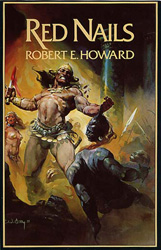
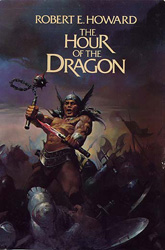
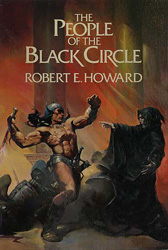
What follows is excerpted from “A View From Corona #13,” a January 11, 2003 editorial by Jeremy Lassen. All of Lassen’s Views From Corona are worth reading, and he’s stockpiled good karma as the Night Shade Books editor who convinced Charles Saunders to write “Betrayal in Blood,” an all-new novella dealing with truculent sword-and-sorcery hero Imaro as a haramia (bandit) chieftain for whom nothing exceeds like excess until the armies of the feuding kingdoms he’s been raiding unite against him. “Betrayal in Blood” is now available as the concluding section of Imaro, the extensively revised version of Saunders’ 1981 novel published by Night Shade earlier this year.
(Continue reading this post)













